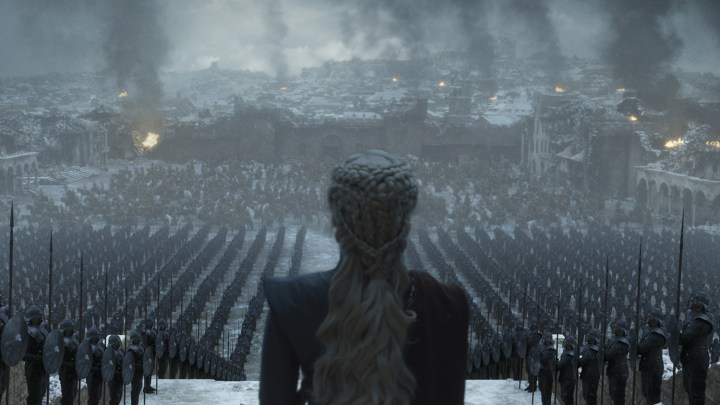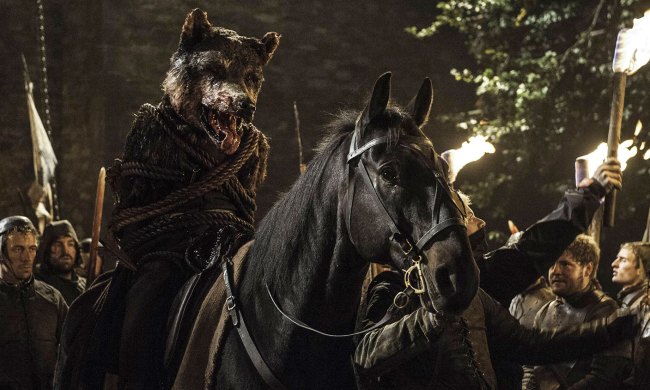
The following contains spoilers from the Game of Thrones season 8 finale.
After nearly a decade, Game of Thrones finally reached its conclusion Sunday night with The Iron Throne. In an episode in which a dragon melts the eponymous chair — the ultimate symbol of power and the ruthless struggle for control of Westeros — the most potent metaphor was unintentional: A plastic water bottle peeking out from behind Sam’s leg during a gathering to decide the future of the realm.
a water bottle in King’s Landing!! #got #gameofthrones pic.twitter.com/mwGQlsLwnh
— Beth (@bethisloco) May 20, 2019
Little production mistakes like this have happened more often than you might think in the history of cinema, but given the high stakes of the episode, and the fact that a similar mistake took place earlier in the season with Daenerys’ infamous coffee cup, it starts to feel like a sign of overarching carelessness, particularly given the harried sloppiness with which the final two seasons of GoT have played out.
If the show was once known for careful plotting and a thoughtful approach to fantasy politics, seasons 7 and 8 were defined by a perfunctory attempt to wrap the story up as quickly as possible, like a student showing up for a class they’re already guaranteed to pass.
More Game of Thrones
The show’s haphazard approach in the final stretch owes a lot to showrunners David Benioff and D.B. Weiss’ decision to finish the tale in eight seasons, with the final two seasons containing seven and six episodes, respectively, rather than the usual 10-episode seasons we had gotten in the past.
Originally, the showrunners hoped to finish in just seven seasons, while HBO wanted more. Then-HBO programming president Michael Lombardo told Entertainment Weekly this in 2015: “Would I love the show to go 10 years as both a fan and a network executive? Absolutely … If they weren’t comfortable going beyond seven seasons, I trust them implicitly and trust that’s the right decision — as horrifying as that is to me.”

The two shortened seasons seem to have been a compromise, and to paraphrase Tyrion from the finale, nobody is particularly happy, so it must be a good compromise.
Nobody is particularly happy, so it must be a good compromise.
Benioff and Weiss thought the finish line was close, with the former saying: “We know basically how many hours are left in this story. We don’t want to add 10 hours to that.”
Watching the last two seasons, however, one can’t help but feel that 10 more hours would have done wonders for the story. As it stands, the show condensed some of the most momentous events in the show into a mere 13 episodes, crossing off the important bullet points in the story’s outline without taking the time to move naturally from one to the next. These seasons were not just shortened, but diminished.
The doomed romance between Jon and Daenerys suffers the most from this approach. It should be the emotional crux of the series: The two most important protagonists meeting, joining forces, falling in love, and fighting together against common foes, all leading to his decision to kill her to save the world from her lust for conquest. As it plays out, Jon and Daenerys become lovers in the finale of season 7, and two episodes into season 8, he has learned that he is also a Targaryen, revealed that information to Daenerys, and opened a rift that essentially kills the romance.

The script makes sure that various characters say out loud that Jon and Daenerys love each other, but the show didn’t have time to delve into their relationship, to make it clear this was one for the ages. When he slips a knife into her, it’s like Shakespeare as told by SparkNotes.
In that same vein, Daenerys’ evolution from ostensible protagonist to the story’s ultimate villain didn’t get the hours it needed. By the start of the final season, the heroes are gearing up for what they imagine to be the ultimate battle for the fate of humanity against the White Walkers, with Daenerys marshaling her might on the side of the living. The battle itself lasts all of an episode, and the role of Main Villain shifts from the Night King to Cersei to Daenerys over the course of three. Although the show takes care to point out Daenerys’ pettiness and entitlement throughout the season, when she finally burns down King’s Landing, it feels like the final move in a game of evil musical chairs.
When he slips a knife into her, it’s like Shakespeare as told by SparkNotes.
GoT’s final seasons were pocked with character moments that felt a bit out of the blue — despite his limited role in season 8 and lack of desire to do anything, Bran is elected king and fully ready to do the job?
Looking at the grand arc of the story, a lot of things make sense, but great stories aren’t made through big moments alone — they’re made through the fine details, the roads that lead from one big moment to another.
That’s something GoT once understood, back when its creators used to double-check for errant water bottles and coffee cups.


